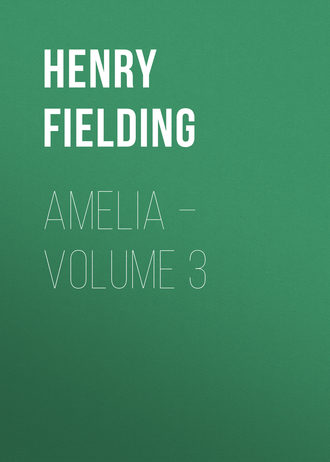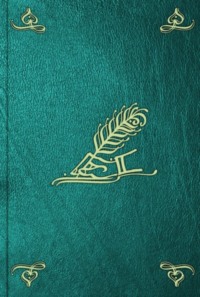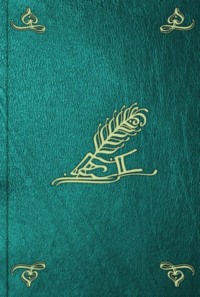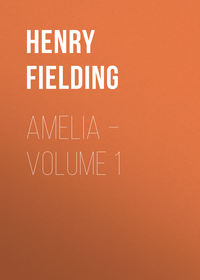 полная версия
полная версияAmelia – Volume 3
"'Desist, therefore, let me advise you, from this enormous crime; retreat from the vain attempt of climbing a precipice which it is impossible you should ever ascend, where you must probably soon fall into utter perdition, and can have no other hope but of dragging down your best friend into perdition with you.
"'I can think of but one argument more, and that, indeed, a very bad one; you throw away that time in an impossible attempt, which might, in other places, crown your sinful endeavours with success.'
"And so ends the dismal ditty."
"D – n me," cries one, "did ever mortal hear such d – ned stuff?"
"Upon my soul," said another, "I like the last argument well enough. There is some sense in that; for d – n me if I had not rather go to D – g – ss at any time than follow a virtuous b – for a fortnight."
"Tom," says one of them, "let us set the ditty to music; let us subscribe to have it set by Handel; it will make an excellent oratorio."
"D – n me, Jack," says another, "we'll have it set to a psalm-tune, and we'll sing it next Sunday at St James's church, and I'll bear a bob, d – n me."
"Fie upon it! gentlemen, fie upon it!" said a frier, who came up; "do you think there is any wit and humour in this ribaldry; or, if there were, would it make any atonement for abusing religion and virtue?"
"Heyday!" cries one, "this is a frier in good earnest."
"Whatever I am," said the frier, "I hope at least you are what you appear to be. Heaven forbid, for the sake of our posterity, that you should be gentlemen."
"Jack," cries one, "let us toss the frier in a blanket."
"Me in a blanket?" said the frier: "by the dignity of man, I will twist the neck of every one of you as sure as ever the neck of a dunghill-cock was twisted." At which words he pulled off his mask, and the tremendous majesty of Colonel Bath appeared, from which the bucks fled away as fast as the Trojans heretofore from the face of Achilles. The colonel did not think it worth while to pursue any other of them except him who had the letter in his hand, which the colonel desired to see, and the other delivered, saying it was very much at his service.
The colonel being possessed of the letter, retired as privately as he could, in order to give it a careful perusal; for, badly as it had been read by the orator, there were some passages in it which had pleased the colonel. He had just gone through it when Booth passed by him; upon which the colonel called to him, and, delivering him the letter, bid him put it in his pocket and read it at his leisure. He made many encomiums upon it, and told Booth it would be of service to him, and was proper for all young men to read.
Booth had not yet seen his wife; but, as he concluded she was safe with Mrs. James, he was not uneasy. He had been prevented searching farther after her by the lady in the blue domino, who had joined him again. Booth had now made these discoveries: that the lady was pretty well acquainted with him, that she was a woman of fashion, and that she had a particular regard for him. But, though he was a gay man, he was in reality so fond of his Amelia, that he thought of no other woman; wherefore, though not absolutely a Joseph, as we have already seen, yet could he not be guilty of premeditated inconstancy. He was indeed so very cold and insensible to the hints which were given him, that the lady began to complain of his dullness. When the shepherdess again came up and heard this accusation against him, she confirmed it, saying, "I do assure you, madam, he is the dullest fellow in the world. Indeed, I should almost take you for his wife, by finding you a second time with him; for I do assure you the gentleman very seldom keeps any other company." "Are you so well acquainted with him, madam?" said the domino. "I have had that honour longer than your ladyship, I believe," answered the shepherdess. "Possibly you may, madam," cries the domino; "but I wish you would not interrupt us at present, for we have some business together." "I believe, madam," answered the shepherdess, "my business with the gentleman is altogether as important as yours; and therefore your ladyship may withdraw if you please." "My dear ladies," cries Booth, "I beg you will not quarrel about me." "Not at all," answered the domino; "since you are so indifferent, I resign my pretensions with all my heart. If you had not been the dullest fellow upon earth, I am convinced you must have discovered me." She then went off, muttering to herself that she was satisfied the shepherdess was some wretched creature whom nobody knew.
The shepherdess overheard the sarcasm, and answered it by asking Booth what contemptible wretch he had picked up? "Indeed, madam," said he, "you know as much of her as I do; she is a masquerade acquaintance like yourself." "Like me!" repeated she. "Do you think if this had been our first acquaintance I should have wasted so much time with you as I have? for your part, indeed, I believe a woman will get very little advantage by her having been formerly intimate with you." "I do not know, madam," said Booth, "that I deserve that character any more than I know the person that now gives it me." "And you have the assurance then," said she, in her own voice, "to affect not to remember me?" "I think," cries Booth, "I have heard that voice before; but, upon my soul, I do not recollect it." "Do you recollect," said she, "no woman that you have used with the highest barbarity – I will not say ingratitude?" "No, upon my honour," answered Booth. "Mention not honour," said she, "thou wretch! for, hardened as thou art, I could shew thee a face that, in spite of thy consummate impudence, would confound thee with shame and horrour. Dost thou not yet know me?" "I do, madam, indeed," answered Booth, "and I confess that of all women in the world you have the most reason for what you said."
Here a long dialogue ensued between the gentleman and the lady, whom, I suppose, I need not mention to have been Miss Matthews; but, as it consisted chiefly of violent upbraidings on her side, and excuses on his, I despair of making it entertaining to the reader, and shall therefore return to the colonel, who, having searched all the rooms with the utmost diligence, without finding the woman he looked for, began to suspect that he had before fixed on the right person, and that Amelia had denied herself to him, being pleased with her paramour, whom he had discovered to be the noble peer.
He resolved, therefore, as he could have no sport himself, to spoil that of others; accordingly he found out Booth, and asked him again what was become of both their wives; for that he had searched all over the rooms, and could find neither of them.
Booth was now a little alarmed at this account, and, parting with Miss Matthews, went along with the colonel in search of his wife. As for Miss Matthews, he had at length pacified her with a promise to make her a visit; which promise she extorted from him, swearing bitterly, in the most solemn manner, unless he made it to her, she would expose both him and herself at the masquerade.
As he knew the violence of the lady's passions, and to what heights they were capable of rising, he was obliged to come in to these terms: for he had, I am convinced, no fear upon earth equal to that of Amelia's knowing what it was in the power of Miss Matthews to communicate to her, and which to conceal from her, he had already undergone so much uneasiness.
The colonel led Booth directly to the place where he had seen the peer and Amelia (such he was now well convinced she was) sitting together. Booth no sooner saw her than he said to the colonel, "Sure that is my wife in conversation with that masque?" "I took her for your lady myself," said the colonel; "but I found I was mistaken. Hark ye, that is my Lord – , and I have seen that very lady with him all this night."
This conversation past at a little distance, and out of the hearing of the supposed Amelia; when Booth, looking stedfastly at the lady, declared with an oath that he was positive the colonel was in the right. She then beckoned to him with her fan; upon which he went directly to her, and she asked him to go home, which he very readily consented to. The peer then walked off: the colonel went in pursuit of his wife, or of some other woman; and Booth and his lady returned in two chairs to their lodgings.
Chapter iii.
Consequences of the masquerade, not uncommon nor surprizing
The lady, getting first out of her chair, ran hastily up into the nursery to the children; for such was Amelia's constant method at her return home, at whatever hour. Booth then walked into the dining-room, where he had not been long before Amelia came down to him, and, with a most chearful countenance, said, "My dear, I fancy we have neither of us supped; shall I go down and see whether there is any cold meat in the house?"
"For yourself, if you please," answered Booth; "but I shall eat nothing."
"How, my dear!" said Amelia; "I hope you have not lost your appetite at the masquerade!" for supper was a meal at which he generally eat very heartily.
"I know not well what I have lost," said Booth; "I find myself disordered. – My head aches. I know not what is the matter with me."
"Indeed, my dear, you frighten me," said Amelia; "you look, indeed, disordered. I wish the masquerade had been far enough before you had gone thither."
"Would to Heaven it had!" cries Booth; "but that is over now. But pray, Amelia, answer me one question – Who was that gentleman with you when I came up to you?"
"The gentleman! my dear," said Amelia; "what gentleman?"
"The gentleman – the nobleman – when I came up; sure I speak plain."
"Upon my word, my dear, I don't understand you," answered she; "I did not know one person at the masquerade."
"How!" said he; "what! spend the whole evening with a masque without knowing him?"
"Why, my dear," said she, "you know we were not together."
"I know we were not," said he, "but what is that to the purpose? Sure you answer me strangely. I know we were not together; and therefore I ask you whom you were with?"
"Nay, but, my dear," said she, "can I tell people in masques?"
"I say again, madam," said he, "would you converse two hours or more with a masque whom you did not know?"
"Indeed, child," says she, "I know nothing of the methods of a masquerade; for I never was at one in my life."
"I wish to Heaven you had not been at this!" cries Booth. "Nay, you will wish so yourself if you tell me truth. – What have I said? do I – can I suspect you of not speaking truth? Since you are ignorant then I will inform you: the man you have conversed with was no other than Lord – ."
"And is that the reason," said she, "you wish I had not been there?"
"And is not that reason," answered he, "sufficient? Is he not the last man upon earth with whom I would have you converse?"
"So you really wish then that I had not been at the masquerade?"
"I do," cried he, "from my soul."
"So may I ever be able," cried she, "to indulge you in every wish as in this. – I was not there."
"Do not trifle, Amelia," cried he; "you would not jest with me if you knew the situation of my mind."
"Indeed I do not jest with you," said she. "Upon my honour I was not there. Forgive me this first deceit I ever practised, and indeed it shall be the last; for I have paid severely for this by the uneasiness it hath given me." She then revealed to him the whole secret, which was thus:
I think it hath been already mentioned in some part of this history that Amelia and Mrs. Atkinson were exactly of the same make and stature, and that there was likewise a very near resemblance between their voices. When Mrs. Atkinson, therefore, found that Amelia was so extremely averse to the masquerade, she proposed to go thither in her stead, and to pass upon Booth for his own wife.
This was afterwards very easily executed; for, when they left Booth's lodgings, Amelia, who went last to her chair, ran back to fetch her masque, as she pretended, which she had purposely left behind. She then whipt off her domino, and threw it over Mrs. Atkinson, who stood ready to receive it, and ran immediately downstairs, and, stepping into Amelia's chair, proceeded with the rest to the masquerade.
As her stature exactly suited that of Amelia, she had very little difficulty to carry on the imposition; for, besides the natural resemblance of their voices, and the opportunity of speaking in a feigned one, she had scarce an intercourse of six words with Booth during the whole time; for the moment they got into the croud she took the first opportunity of slipping from him. And he, as the reader may remember, being seized by other women, and concluding his wife to be safe with Mrs. James, was very well satisfied, till the colonel set him upon the search, as we have seen before.
Mrs. Atkinson, the moment she came home, ran upstairs to the nursery, where she found Amelia, and told her in haste that she might very easily carry on the deceit with her husband; for that she might tell him what she pleased to invent, as they had not been a minute together during the whole evening.
Booth was no sooner satisfied that his wife had not been from home that evening than he fell into raptures with her, gave her a thousand tender caresses, blamed his own judgment, acknowledged the goodness of hers, and vowed never to oppose her will more in any one instance during his life.
Mrs. Atkinson, who was still in the nursery with her masquerade dress, was then summoned down-stairs, and, when Booth saw her and heard her speak in her mimic tone, he declared he was not surprized at his having been imposed upon, for that, if they were both in the same disguise, he should scarce be able to discover the difference between them.
They then sat down to half an hour's chearful conversation, after which they retired all in the most perfect good humour.
Chapter iv.
Consequences of the masquerade
When Booth rose in the morning he found in his pocket that letter which had been delivered to him by Colonel Bath, which, had not chance brought to his remembrance, he might possibly have never recollected.
He had now, however, the curiosity to open the letter, and beginning to read it, the matter of it drew him on till he perused the whole; for, notwithstanding the contempt cast upon it by those learned critics the bucks, neither the subject nor the manner in which it was treated was altogether contemptible.
But there was still another motive which induced Booth to read the whole letter, and this was, that he presently thought he knew the hand. He did, indeed, immediately conclude it was Dr Harrison; for the doctor wrote a very remarkable one, and this letter contained all the particularities of the doctor's character.
He had just finished a second reading of this letter when the doctor himself entered the room. The good man was impatient to know the success of Amelia's stratagem, for he bore towards her all that love which esteem can create in a good mind, without the assistance of those selfish considerations from which the love of wives and children may be ordinarily deduced. The latter of which, Nature, by very subtle and refined reasoning, suggests to us to be part of our dear selves; and the former, as long as they remain the objects of our liking, that same Nature is furnished with very plain and fertile arguments to recommend to our affections. But to raise that affection in the human breast which the doctor had for Amelia, Nature is forced to use a kind of logic which is no more understood by a bad man than Sir Isaac Newton's doctrine of colours is by one born blind. And yet in reality it contains nothing more abstruse than this, that an injury is the object of anger, danger of fear, and praise of vanity; for in the same simple manner it may be asserted that goodness is the object of love.
The doctor enquired immediately for his child (for so he often called Amelia); Booth answered that he had left her asleep, for that she had had but a restless night. "I hope she is not disordered by the masquerade," cries the doctor. Booth answered he believed she would be very well when she waked. "I fancy," said he, "her gentle spirits were a little too much fluttered last night; that is all."
"I hope, then," said the doctor, "you will never more insist on her going to such places, but know your own happiness in having a wife that hath the discretion to avoid those places; which, though perhaps they may not be as some represent them, such brothels of vice and debauchery as would impeach the character of every virtuous woman who was seen at them, are certainly, however, scenes of riot, disorder, and intemperance, very improper to be frequented by a chaste and sober Christian matron."
Booth declared that he was very sensible of his error, and that, so far from soliciting his wife to go to another masquerade, he did not intend ever to go thither any more himself.
The doctor highly approved the resolution; and then Booth said, "And I thank you, my dear friend, as well as my wife's discretion, that she was not at the masquerade last night." He then related to the doctor the discovery of the plot; and the good man was greatly pleased with the success of the stratagem, and that Booth took it in such good part.
"But, sir," says Booth, "I had a letter given me by a noble colonel there, which is written in a hand so very like yours, that I could almost swear to it. Nor is the stile, as far as I can guess, unlike your own. Here it is, sir. Do you own the letter, doctor, or do you not?"
The doctor took the letter, and, having looked at it a moment, said,
"And did the colonel himself give you this letter?"
"The colonel himself," answered Booth.
"Why then," cries the doctor, "he is surely the most impudent fellow that the world ever produced. What! did he deliver it with an air of triumph?"
"He delivered it me with air enough," cries Booth, "after his own manner, and bid me read it for my edification. To say the truth, I am a little surprized that he should single me out of all mankind to deliver the letter to; I do not think I deserve the character of such a husband. It is well I am not so very forward to take an affront as some folks."
"I am glad to see you are not," said the doctor; "and your behaviour in this affair becomes both the man of sense and the Christian; for it would be surely the greatest folly, as well as the most daring impiety, to risque your own life for the impertinence of a fool. As long as you are assured of the virtue of your own wife, it is wisdom in you to despise the efforts of such a wretch. Not, indeed, that your wife accuses him of any downright attack, though she hath observed enough in his behaviour to give offence to her delicacy."
"You astonish me, doctor," said Booth. "What can you mean? my wife dislike his behaviour! hath the colonel ever offended her?"
"I do not say he hath ever offended her by any open declarations; nor hath he done anything which, according to the most romantic notion of honour, you can or ought to resent; but there is something extremely nice in the chastity of a truly virtuous woman."
"And hath my wife really complained of anything of that kind in the colonel?"
"Look ye, young gentleman," cries the doctor; "I will have no quarrelling or challenging; I find I have made some mistake, and therefore I insist upon it by all the rights of friendship, that you give me your word of honour you will not quarrel with the colonel on this account."
"I do, with all my heart," said Booth; "for, if I did not know your character, I should absolutely think you was jesting with me. I do not think you have mistaken my wife, but I am sure she hath mistaken the colonel, and hath misconstrued some over-strained point of gallantry, something of the Quixote kind, into a design against her chastity; but I have that opinion of the colonel, that I hope you will not be offended when I declare I know not which of you two I should be the sooner jealous of."
"I would by no means have you jealous of any one," cries the doctor; "for I think my child's virtue may be firmly relied on; but I am convinced she would not have said what she did to me without a cause; nor should I, without such a conviction, have written that letter to the colonel, as I own to you I did. However, nothing I say hath yet past which, even in the opinion of false honour, you are at liberty to resent! but as to declining any great intimacy, if you will take my advice, I think that would be prudent."
"You will pardon me, my dearest friend," said Booth, "but I have really such an opinion of the colonel that I would pawn my life upon his honour; and as for women, I do not believe he ever had an attachment to any."
"Be it so," said the doctor: "I have only two things to insist on. The first is, that, if ever you change your opinion, this letter may not be the subject of any quarrelling or fighting: the other is, that you never mention a word of this to your wife. By the latter I shall see whether you can keep a secret; and, if it is no otherwise material, it will be a wholesome exercise to your mind; for the practice of any virtue is a kind of mental exercise, and serves to maintain the health and vigour of the soul."
"I faithfully promise both," cries Booth. And now the breakfast entered the room, as did soon after Amelia and Mrs. Atkinson.
The conversation ran chiefly on the masquerade; and Mrs. Atkinson gave an account of several adventures there; but whether she told the whole truth with regard to herself I will not determine, for, certain it is, she never once mentioned the name of the noble peer. Amongst the rest, she said there was a young fellow that had preached a sermon there upon a stool, in praise of adultery, she believed; for she could not get near enough to hear the particulars.
During that transaction Booth had been engaged with the blue domino in another room, so that he knew nothing of it; so that what Mrs. Atkinson had now said only brought to his mind the doctor's letter to Colonel Bath, for to him he supposed it was written; and the idea of the colonel being a lover to Amelia struck him in so ridiculous a light, that it threw him into a violent fit of laughter.
The doctor, who, from the natural jealousy of an author, imputed the agitation of Booth's muscles to his own sermon or letter on that subject, was a little offended, and said gravely, "I should be glad to know the reason of this immoderate mirth. Is adultery a matter of jest in your opinion?"
"Far otherwise," answered Booth. "But how is it possible to refrain from laughter at the idea of a fellow preaching a sermon in favour of it at such a place?"
"I am very sorry," cries the doctor, "to find the age is grown to so scandalous a degree of licentiousness, that we have thrown off not only virtue, but decency. How abandoned must be the manners of any nation where such insults upon religion and morality can be committed with impunity! No man is fonder of true wit and humour than myself; but to profane sacred things with jest and scoffing is a sure sign of a weak and a wicked mind. It is the very vice which Homer attacks in the odious character of Thersites. The ladies must excuse my repeating the passage to you, as I know you have Greek enough to understand it: —
Os rh' epea phresin esin akosma te, polla te edeMaps, atar ou kata kosmon epizemenai basileusin,All'o, ti oi eisaito geloiton ArgeiosinEmmenai5And immediately adds,
– aiskistos de aner ypo Ilion elthe6"Horace, again, describes such a rascal:
– SolutosQui captat risus hominum famamque dicacis,7and says of him,
Hic niger est, hunc tu, Romane, caveto."8
"O charming Homer!" said Mrs. Atkinson, "how much above all other writers!"
"I ask your pardon, madam," said the doctor; "I forgot you was a scholar; but, indeed, I did not know you understood Greek as well as Latin."
"I do not pretend," said she, "to be a critic in the Greek; but I think I am able to read a little of Homer, at least with the help of looking now and then into the Latin."
"Pray, madam," said the doctor, "how do you like this passage in the speech of Hector to Andromache:
– Eis oikon iousa ta sautes erga komize,Iston t elakaten te, kai amphipoloisi keleueErgon epoichesthai?9"Or how do you like the character of Hippodamia, who, by being the prettiest girl and best workwoman of her age, got one of the best husbands in all Troy? – I think, indeed, Homer enumerates her discretion with her other qualifications; but I do not remember he gives us one character of a woman of learning. – Don't you conceive this to be a great omission in that who, by being the prettiest girl and best workwoman of her age, got one of the best husbands in all Troy? – I think, indeed, Homer enumerates her discretion with her other qualifications; but I do not remember Don't you conceive this to be a great omission in that charming poet? However, Juvenal makes you amends, for he talks very abundantly of the learning of the Roman ladies in his time."









